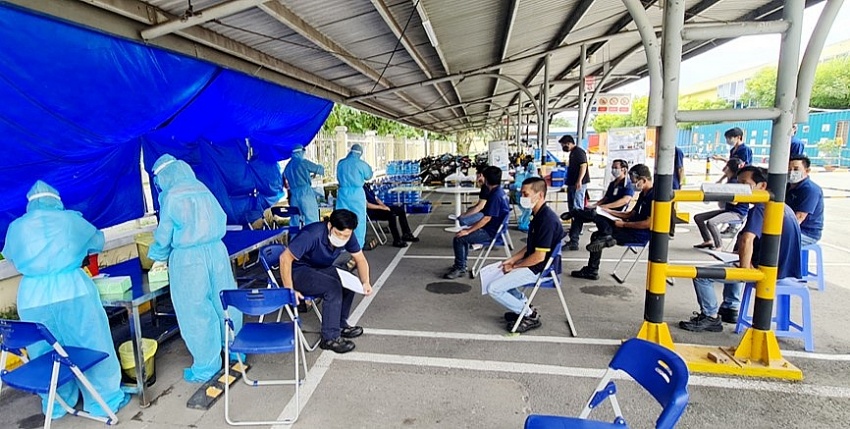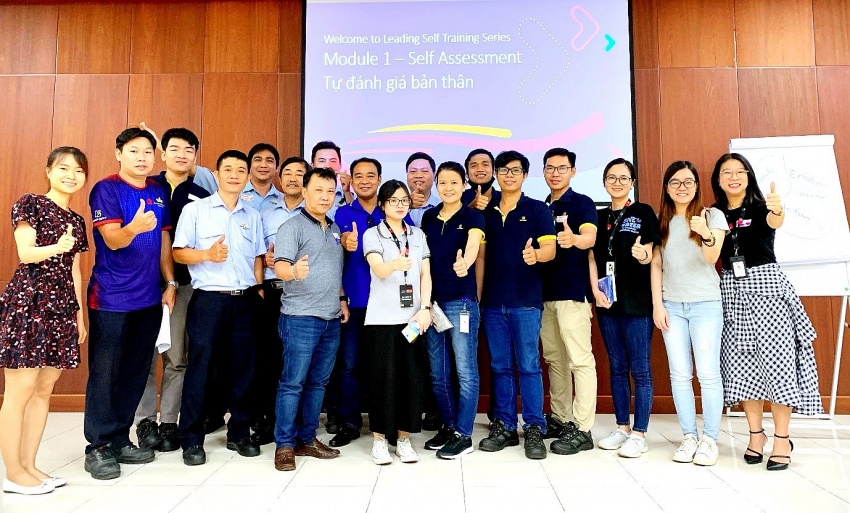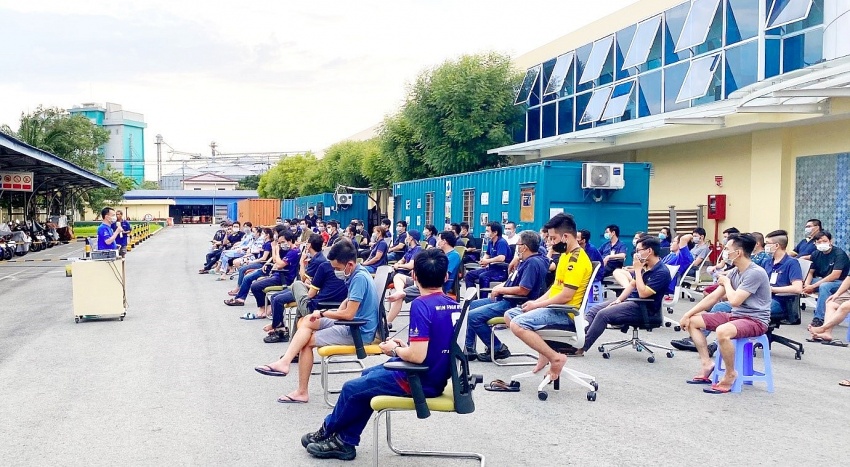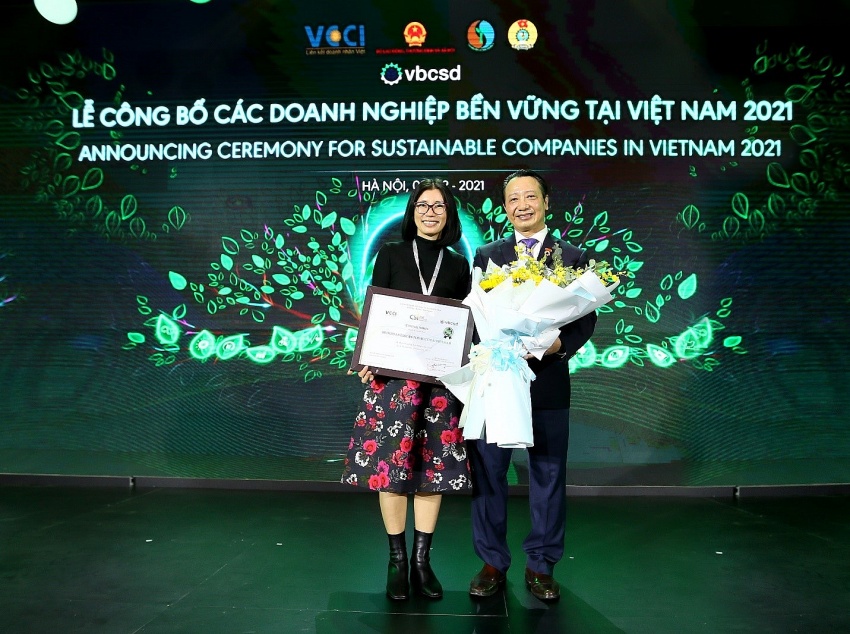Striving for sustainability amid the pandemic
According to a recent survey on the impact of the pandemic on enterprises carried out by the Vietnam Chamber of Commerce and Industry (VCCI) and the World Bank, over 87 per cent of participating businesses have been affected by the pandemic. Sectors like textiles and garments, real estate, education, retail, electronics, and tourism have been among the hardest hit.
Like other enterprises, British American Tobacco (BAT) in Vietnam has experienced these difficulties due to interruptions in the supply chain, issues with work permits for foreign experts, and narrowed production scale, among others..
Despite this, BAT and many other companies have remained strong and overcome the challenges thanks to the united staff who adopted the stay-at-work model to stabilise production, ensure income, and embrace the corporate culture.
 |
| COVID-19 tests are carried out at one of BAT’s factories in Vietnam |
According to experts, organisational culture plays a pivotal role in the success of any business, and the importance of culture was further heightened by the unprecedented challenges of COVID-19.
Strong corporate culture
Most companies did a solid job of addressing their employees’ basic needs of safety, stability, and security during the first phase of the crisis, but those needs are calling for a more sophisticated approach. The values of BAT’s culture have been promoted strongly as the company had to maintain employee engagement and development during the pandemic.
At BAT Vietnam, the company cared for its employees physically and mentally, thereby building a strong and cohesive community. Employees have had to switch to working from home, but that has not faded their sense of community spirit. In fact, it has been enhanced significantly through a wide range of activities.
For instance, the “No Meeting Day” was held every month to give back time for employees to spend the day in any way they prefer, as well as the “Covid Care” programme.
The company also holds monthly town hall meetings to ensure everyone in the organisation is kept up to date on key information. These meetings were moved to a virtual setting later. Constant communication with teams has been pivotal to ensuring connectivity, even when physical proximity was a challenge. BAT has also used the internal communications portal Yammer effectively during the period to ensure continuous dialogue, and senior leaders have extended their efforts to ensure employees were connected.
Especially, the company's wellness week received strong support from its employees. Through a series of five talks running consecutively during the week, more than 100 people were trained about the different aspects of wellness and its importance. An online portal is now available exclusively for employees with articles, videos, and tools to help improve overall wellness.
At BAT, talent development has also remained a key agenda. In Vietnam, the company has utilised a multitude of methods to develop employee capability with the support of senior leaders. Physical and virtual training, coaching and mentoring, and projects with the right balance of support and stretch are some of these key methodologies.
The Grid campaign was one such initiative. The Grid is a one-stop-shop model for all training needs and is accessible anytime, anywhere. The novel platform provides opportunities for employees to build their knowledge and close development gaps, and explore a wide range of leadership, functional, and digital capabilities to thrive in their roles. This provides flexibility for employees to drive their development agenda proactively.
Throughout the year, the company conducted over 60 training programmes covering the vast majority of employees and field staff. It also provided two international assignment opportunities for management staff, as well as offered employees more opportunities to enhance their international exposure while based in Vietnam.
 |
| Participants of one of the Investment In People seminars that helped to build and elevate future talents |
At the same time, the company also fought a relentless battle to maintain manufacturing operations. To ensure that workers could pull through the challenging time with resilience, the firm acted promptly to arrange on-site accommodations for factory employees. Sites were converted for staff accommodation in less than a week with sufficient living necessities including meals, laundry, personal hygiene, and healthcare.
Moreover, a positive team spirit has been maintained among stay-at-work employees through various activities like sports, birthdays, and vegetable-growing, as well as frequent sharing and communication from the leadership.
 |
| Outdoor events have been held to ensure the mental health of stay-at-work employees |
Pham Hung Anh Tuan, head of operations at BAT East Asia Cluster said, “All activities show our strong commitment to maintaining continuous production to ensure supply to the market.”
In addition to these internal activities, BAT Vietnam also joined hands with the country to support people in need through providing food packages for impoverished people in the Central Highlands province of Gia Lai in February, as well as in Ho Chi Minh City, Phu Yen, and Khanh Hoa provinces in August. The firm also contributed $50,000 to the government’s Vaccine Fund.
Striving for sustainability
Sustainable development is now an inevitable trend in Vietnam and has been reinforced in the Party's and government’s recent orientations for the upcoming years. According to experts, digital transformation, renovation, and sustainable development are the key pillars for sustainable business growth.
Pham Tan Cong, president at VCCI, said businesses have been quick to include sustainable development in their overall strategies. In practice, businesses that build their sustainability-driven governance models have a higher capacity to adapt to challenges than others.
“Applying the sustainable business and governance model is truly an efficient vaccine for businesses to increase their adaption and resistance capability. Adaption and resistance capability have become core competitiveness factors for them and the economy,” he noted.
According to the United Nations Development Programme (UNDP), Vietnam is well placed within Asia in terms of the general progress in implementing the Sustainable Development Goals (SDG). Resident Representative a.i. in Vietnam, Terence D. Jones, suggested that Vietnam needs to mobilise more support from the international community to invest in what it is trying to achieve. "The government should improve governance systems through digitalisation and engage social organisations and the private sector to play their part in achieving these goals," he said.
As a result, BAT has been steadily adopting the SDGs over the past two decades in Vietnam. And corporate culture is an essential factor for the company to achieve its sustainable development and strategic objectives.
Thanks to its commitment and actions, BAT Vietnam was honoured with several awards in Asia. The company has also won numerous sustainable development awards, including the Corporate Sustainability Index 2021. Last year also marked the third year it was named among the 100 most sustainable companies in Vietnam by VCCI.
 |
| Do Hoang Anh, head of legal & external affairs at BAT East Asia Cluster, represented the firm in receiving the certificate for the company's recognition among the top 100 sustainable companies in Vietnam |
“This is recognition for the company’s contribution and commitments to local sustainable development. It is solid evidence of our sustainable development commitments, and a big motivation for the company and its staff to move forward,” noted Do Hoang Anh, head of legal & external affairs at BAT East Asia Cluster.
What the stars mean:
★ Poor ★ ★ Promising ★★★ Good ★★★★ Very good ★★★★★ Exceptional
Themes: Towards Sustainability
- $100 million initiative launched to protect forests and boost rural incomes
- Decree opens incentives for green urban development
- European expertise to boost Vietnam’s sustainable logistics push
- Living with water: from policy to practice of the 'sponge cities' concept
- From climate pressure to new urban mindsets
Related Contents
Latest News
More News
- Tet event in Japan celebrates success of 14th National Party Congress (January 25, 2026 | 10:04)
- 14th National Party Congress wraps up with success (January 25, 2026 | 09:49)
- Congratulations from VFF Central Committee's int’l partners to 14th National Party Congress (January 25, 2026 | 09:46)
- List of newly-elected members of 14th Political Bureau announced (January 23, 2026 | 16:27)
- 14th Party Central Committee unanimously elects To Lam as General Secretary (January 23, 2026 | 16:22)
- List of members of 14th Party Central Committee announced (January 23, 2026 | 09:12)
- Highlights of fourth working day of 14th National Party Congress (January 23, 2026 | 09:06)
- Press provides timely, accurate coverage of 14th National Party Congress (January 22, 2026 | 09:49)
- Press release on second working day of 14th National Party Congress (January 22, 2026 | 09:19)
- Minister sets out key directions to promote intrinsic strength of Vietnamese culture (January 22, 2026 | 09:16)

 Tag:
Tag:























 Mobile Version
Mobile Version